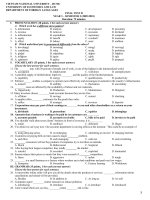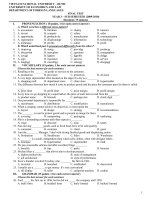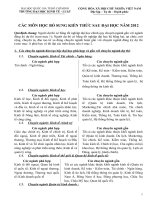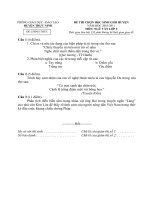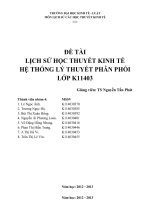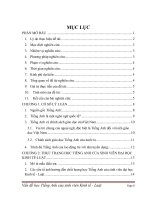Đề thi và đáp án môn Anh văn Trường Đại học kinh tế- luật - đề thi 3A
Bạn đang xem bản rút gọn của tài liệu. Xem và tải ngay bản đầy đủ của tài liệu tại đây (128.59 KB, 6 trang )
VIETNAM NATIONAL UNIVERSITY – HCMC
UNIVERSITY OF ECONOMICS AND LAW
DEPARTMENT OF FOREIGN LANGUAGES
FINAL TEST A
YEAR 3 – SEMESTER 2 (2009-2010)
Duration: 75 minutes
I. PRONUNCIATION ( 10 points, 1 for each correct answer)
A. Which word has a different stress pattern?
1. A. currency B. dividend C. deposit D. turnover
2. A. resilience B. infrastructure C. initiative D. competitor
3. A. exchange B. tactic C. asset D. labour
4. A. domestic B. corruption C. computer D. shareholder
5. A. tourism B. revenue C. department D. industry
B. Which underlined part is pronounced differently from the others?
6. A. innovate B. corporate C. negotiate D. differentiate
7. A. liability B. debtor C. subsidiary D. global
8. A. trend B. encourage C. expensive D. percentage
9. A. attempt B. company C. America D. manager
10. A. markets B. exports C. earnings D. groups
II. VOCABULARY (15 points, 1 for each correct answer)
Choose the best answer for each sentence.
11. Some countries lack a suitable economic _______.
A. company B. market C. infrastructure D. manufacturer
12. You shouldn’t talk about your clients’ business in front of everyone, it is _________.
A. unethical B. dishonest C. illegal D. unfair
13. Among UK supermarkets, Tesco sells more than any of the other chains. It has the highest market _______.
A. share B. arrangement C. leader D. stock
14. I phoned to check on my _______, but they said they had already hired someone.
A. referees B. curriculum vitae C. application D. qualifications
15. A _______ is a symbol used by a company to identify and advertise its goods.
A. trademark B. tactic C. franchise D. supremacy
16. _______, making your products seem very special in the market place, is one of the strategies companies employ to
become a market leader.
A. Cost focus B. Differentiation C. Acquisitions D. Marketing
17. ‘I’m afraid we can’t pay now. Our accounts department is moving offices at the moment.’ This could be an
example of _______.
A. charging interest B. overcharging C. submitting an invoice D. using delaying tactics
18. I’ve given the latest sales _______ to Mr. Allen but he hasn’t had a chance to look at them yet.
A. systems B. figures C. worksheets D. facts
19. Ian has to be very organised as his work involves meeting tight _______.
A. problems B. responsibilities C. challenges D. deadlines
20. Paul enjoys working at Small World because he finds the _______ stimulating.
A. installation B. environment C. application D. opportunity
21. Most governments now _______ paper money in the form of notes.
A. deliver B. pass C. spread D. issue
22. A dividend is the share of the _____ that the shareholders receive.
A. assets B. profits C. liabilities D. debts
1
23. Annual reports include profit and loss accounts which show _______, or the total sum of money which is coming
into the company.
A. base rate B. tax year C. turnover D. net profit
24. Anyone can buy shares in a public company and become a _______.
A. dividend B. shareholder C. creditor D. debtor
25. Many _______, (people who use their money to earn more money), choose foreign or offshore bank accounts
because they are tax-free.
A. investors B. customers C. consumers D. taxmen
III. GRAMMAR (15 points, 1 for each correct answer)
Choose the best answer for each sentence.
26. Companies know that good practice involves _______ good working conditions.
A. providing B. provided C. provide D. to provide
27. Companies agree _______ stricter measures to reduce pollution.
A. to introduce B. introducing C. introduce D. introduced
28. Companies must _______ a profit. If they don’t, there will be no jobs for the workforce.
A. make B. made C. making D. to make
29. If a company _______ irresponsible marketing, customers _______ its products.
A. conducts/ will not buy B. conduct/ do not buy C. conducts/ not buy D. conduct/ will not buy
30. Many customers _______ products if companies _______ them on animals.
A. won’t buy/ test B. won’t buy/ tests C. won’t buy/ tested D. don’t buy/ will test
31. Coca-Cola has been the number one soft drink in France _______ 1966.
A. for B. since C. in D. ago
32. Coca-Cola and Pepsi have been in competition _______ many years.
A. ago B. for C. since D. to
33. The Coca-Cola recipe hasn’t changed _______ 1886.
A. for B. since C. at D. in
34. I don’t mind which one you buy, _______ cotton _______ silk is fine.
A. either/ or B. both/ and C. either/ nor D. neither/ or
35. _______ Cafédirect _______ Traidcraft pay ‘first world’ prices for ‘third world’ products.
A. Both/ and B. Either/ nor C. Neither/ or D. Either/ and
36. Like Finland, Norway _____ showed strong growth last year.
A. too B. as well C. in addition D. also
37. It was a great success to the company last year. Its operating profit increased by_______.
A. third quarter B. third quarters C. three quarters D. three quarter
38. The bank _______ our overdraft.
A. raised B. rose C. arose D. rises
39. Vauxhall cars _____ in Zaragoza.
A. to make B. is making C. are made D. made
40. The same problem might _______ on the new account.
A. arise B. raise C. rose D. be raising
IV. READING (40 points)
Part 1: Choose the best answer to complete the following passage. (20 points, 2 for each correct answer)
‘My name is Peter Gill. I manage the One World (41) _____ investment fund. We follow a very clear (42) _____ of
conduct when we choose stocks. We only (43) _____ in companies that are socially (44) _____ so we don’t put money into
tobacco companies or arms manufacturers. Green (45) _____ are very important to us. We check that our companies are not
damaging the (46) _____. We invest in some companies that make their products in countries where (47) _____ is cheaper,
and we make sure that they do not (48) _____ their workers. Some expensive, famous brand clothing is made in (49) _____
where people work long hours for very low wages. We think that is completely (50) _____.
41. A. honesty B. ethical C. rights D. perfection
2
42. A. note B. list C. code D. paper
43. A. produce B. make C. enter D. invest
44. A. responsible B. spectacular C. interested D. luxurious
45. A. issues B. actions C. indexes D. points
46. A. neighbours B. environment C. local D. events
47. A. work B. job C. labour D. career
48. A. export B. employ C. expect D. exploit
49. A. sweatshops B. sweatshirts C. sweetshops D. sweatpants
50. A. moral B. unethical C. social D. fair
Part 2: Read the following article and choose the best answer for each question (10 points, 2 for each correct answer)
A massive banking crisis occurred in the United States in 1933. In the two preceding years, a large number of
banks had failed, and fear of lost savings had prompted many depositors to remove their funds from banks. Problems
became so serious in the state of Michigan that Governor William A. Comstock was forced to declare a moratorium on all
banking activities in the state on February 14, 1933. The panic in Michigan quickly spread to other states, and on March 6,
President Franklin D. Roosevelt declared a banking moratorium throughout the United States that left the entire country
without banking services.
Congress immediately met in a special session to solve the banking crisis and on March 9 passed the Emergency
Banking Act of 1933 to assist financially healthy banks to reopen. By March 15, banks controlling 90 percent of the
country’s financial reserves were again open for business.
51. The passage states that all the following occurred prior to 1933 EXCEPT that __________.
A. many banks went under
B. many bank patrons were afraid of losing their deposits
C. a lot of money was withdrawn from accounts
D. Governor Comstock canceled all banking activities in Michigan
52. The word “moratorium” in line 3 is closest in meaning to which of the following?
A. Death B. Murder C. Temporary cessation D. Slow decline
53. The passage indicates that the moratorium declared by Roosevelt affected __________.
A. the banks in Michigan B. all the banks in the United States
C. only the financially unhealthy banks D. the banks in most of the United States
54. Which of the following can be inferred from the passage?
A. Congress did not give any special priority to the banking situation.
B. The Emergency Banking Act helped all banks to reopen.
C. Ninety percent of the banks reopened by the middle of March.
D. Ten percent of the country’s money was in financially unhealthy banks.
55. Which of the following best describes the organization of the passage?
A. Opposing viewpoints of an issue B. A theme followed by an example
C. A problem and its causes D. A problem and a solution
Part 3: Read the following passage and choose the best answer for each question (10 points, 2 for each correct answer)
It is the role of the Federal Reserve, known simply as the Fed, to control the supply of money in the U.S. through
its system of twelve regional Federal Reserve Banks, each with its own Federal Reserve District Bank. Many commercial
banks belong to the Federal Reserve System and as members must follow the Fed’s reserve requirements, a ruling by the
Fed on the percentage of deposits that a member bank must keep either in its own vaults or on deposit at the Fed. If the Fed
wants to change the money supply, it can change reserve requirements to member banks; for example, an increase in the
percentage of deposits required to be kept on hand would reduce the available money supply. Member banks can also
borrow money from the Fed, and an additional way that the Fed can control the money supply is to raise or lower the
discount rate, the interest rate at which commercial banks borrow from the Fed. An increase in the discount rate would
reduce the funds available to commercial banks and thus shrink the money supply. In addition to using reserve
requirements and the discount rate to control the money supply, the Fed has another powerful tool: open-market operations.
56. This passage is mainly about __________.
A. the functions of the Federal Reserve B. the organization of the Federal Reserve
C. reserve requirements D. the effect of lowering the discount rate
3
57. According to the passage, the main purpose of the Federal Reserve System is to __________.
A. increase reserve requirements
B. increase or decrease the amount of money available
C. increase the number of Federal Reserve Banks
D. increase the money kept on deposit by member banks
58. When the Fed controls the percentage of deposits kept on hand by member banks, it controls __________.
A. district banks B. the discount rate
C. the reserve requirement D. borrowing by commercial banks
59. The passage implies that a lowering of the discount rate would lead to __________.
A. an increase in the money supply
B. a decrease in borrowing from the Fed by commercial banks
C. a decrease in the money available
D. an increase in the reserve requirement
60. The word “shrink” in the passage could best be replaced by __________.
A. increase B. inflate C. support D. reduce
4
V. BUSINESS COMMUNICATION (20 points, 2 for each correct answer)
Choose the most appropriate question/statement for each situation.
61. Woman: ___________________________
Man: Yes, of course. Go ahead.
A. Do you ever work at home?
B. Excuse me. Can I ask you a few questions?
C. Have you traveled for business?
D. Do you have time for a social life?
62. Peter: ___________________________
Ann: Just one moment. I’m afraid that line is busy.
A. Could you put me through to her secretary?
B. Can you give me your number?
C. How may I help you?
D. Can I leave a message?
63. Mary: ___________________________
Tom: It doesn't matter right now, either one would be OK.
A. Can you work part-time or full-time?
B. What kind of job would you like?
C. If you would like to do that, sign here, OK?
D. I was wondering if you could help me use the
Student Job Center.
64. Richard: ___________________________
Ann: I am probably best at researching for marketing
purposes.
A. What is your biggest weakness?
B. Did you find your way here OK?
C. What would you consider your strengths?
D. Now, do you prefer group projects?
65. Joe: ___________________________
Susan: No, I need directions, please.
A. Are mornings or afternoons best?
B. I lost track of time, am I late?
C. Is there anywhere else we can get these supplies?
D. Do you know how to get there?
66. Barry: ___________________________
Brett: I need all of my supplies right away.
A. How do I order the office supplies that I need?
B. How quickly will you need your supplies?
C. How much do you have for office supplies?
D. Would you like these supplies delivered or would you like
to pick them up?
67. Stephen: ___________________________
Tim: Down the hall. I'll show you when the interview is over.
A. Do we get paid time off?
B. What type of professional development do you offer?
C. Where do I sign up for my benefits package?
D. What does the benefits package include?
68. Nick: ___________________________
Joe: How about the new Chinese place next door?
A. How is it going with you today?
B. Sounds like a plan. Where would you like to meet?
C. Good morning, this is Ray speaking. Is Lee in?
D. I am doing well. How can I help you?
69. Russel: ___________________________
Sandy: I would love to have an eleven o'clock appointment.
A. Thursday is available; would ten or eleven be best?
B. Certainly, what day would be best for you?
C. I was wondering if I could reschedule my appointment to a
later date?
D. Do you need it for the whole weekend?
70. Mr. Sorensen: ___________________________
Richard: Tomorrow night would work for me.
A. Should we just meet here?
B. What would be the best time for you to help me?
C. Would you like to meet at the coffee house next door?
D. How about meeting in my office?
-THIS IS THE END OF THE FINAL TEST-
______________________________________________________________________________________________
ANSWER SHEET
Student’s full name: ______________________________________Student’s code: ___________________
Blacken the A, B, C or D for each answer.
5

